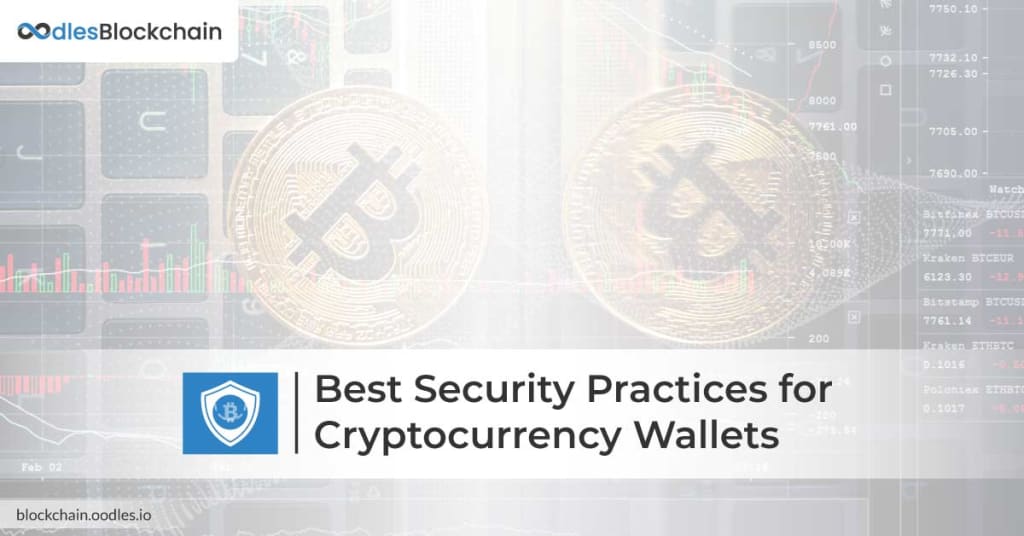Security Mechanisms for Crypto Wallet Development
Published by: Oodles Blockchain

From a security perspective, cryptocurrency wallets are as vulnerable as social media accounts and file storage systems. Cryptocurrency wallets are transforming conventional banking account systems by residing in hard drives, laptops, and mobile phones. Their security depends on robust measures to safeguard the digital assets of wallet owners and their transactions.
In this blog, we have explored key cryptocurrency wallet security mechanisms that businesses should consider before developing a cryptocurrency wallet.
Two-factor authentication
Two-factor authentication, also known as 2FA, is a text code that a user receives on his phone. Sometimes, 2FA may also require a thumbprint. It is another secure method to ensure that only an authorized person gets access to the wallet.
If someone manages to crack the password through any methods, they will still need to pass the second-level authentication. It will typically be a code sent to the user’s phone, to be entered into a sign-in field to access the wallet.
Multi-sig or single-use?
Usually, a single-key address means that whoever holds the corresponding private key gets access to all funds. Effectively, it means that a user only needs one key to sign transactions without requiring authorization from anybody else. While managing a single-key address is more efficient than a multi-sig, it leads to certain security challenges. Having a single key access enables only one single point of failure to protect funds. However, it also becomes the target of cybercriminals who constantly develop new phishing techniques to break in. Moreover, the single-key address is not a suitable option for medium to large businesses that depend on cryptocurrencies. Imagine a company stores funds on a standard address with a single corresponding private key. It implies that the private key either needs to be entrusted to a single person or assigned to multiple entities.
Multisig wallets, however, offer a solution to tackle both problems. With a multi-sig address, a user can only move funds after getting multiple signatures from defined entities.
Wallet encryption
Encrypting the wallet with securities like AES-256-CBC adds an extra layer of security and protects it with a passphrase. By using a passphrase, users can lock their funds from being spent. So, even if attackers gain access to the device on which the wallet is running, they will fail to do anything unless they get access to the passphrase. However, there are instances where cryptocurrency wallet developers do not consider using this method. The reason being that encryption/decryption for every transaction increases the processing time. As a result, it increases costs and affects services.
DDoS Attacks
A DDoS (Distributed Denial-of-Service) attack is a method that hackers use to disrupt legitimate users' access to a target network or web resource. Typically, they accomplish this by overloading the target with a huge amount of traffic or disseminating malicious requests. It causes the target resource to crash or malfunction entirely.
As cryptocurrencies have gained significant traction in recent years, crypto exchanges and wallets have become increasingly popular targets for DDoS attacks.
A crypto wallet development company can implement DDoS mitigation systems like anti-DDoS hardware and software modules. They occur in the form of load balancers and network firewalls or specialized web applications. Their ability to prevent malicious access requests and sudden surges in traffic is effective in preventing DDoS attacks.
Security Alerts
Configuration of multiple alerts for withdrawals and deposits from a wallet ascertains that no information goes unnoticed such as:
- First-time deposit to a fresh wallet
- First-time withdrawal from a fresh wallet
- X percent variation from last withdrawals
- Same value withdrawal from the same wallet for consecutive X days
- Withdrawal from a new IP device
- Mobile number change request before a withdrawal
- Password change before a withdrawal
- Second withdrawal for the day
Similarly, businesses providing cryptocurrency wallet services can configure many other necessary triggers as per specific business requirements.
Phishing Attacks
Phishing is the practice of misguiding users with phishing content occurring in the form of web content, e-mail, or social media content. Hackers attack potential users with phishing content to break into the wallet to steal vital information like private and public keys.
To safeguard cryptocurrency wallets from phishing attacks, anti-phishing software is ideal. It is software that consists of computer programs that identify any phishing content that may be used to access wallet data. In addition, it blocks the content, usually with a warning to the user. Usually, crypto developers integrate it with web browsers and email clients as a toolbar. Then, it displays the real domain name for the website that a user is accessing. Besides, it also attempts to prevent fraudulent websites from masquerading as legitimate websites.
Notification on Critical Activities
Activating notifications of necessary actions and activities such as logins, transactions, trades, and profile and KYC status updates increase visibility for the network admin, especially in multi-sig wallets. It enables the admin to monitor and identify any malicious or fraudulent activity instantly.
You Might Also Be Interested In:
Cryptocurrency Exchange Software Development
The Ins and Outs of Cryptocurrency Wallet Apps Development
Several measures are available to secure cryptocurrency wallets. In addition to the above-mentioned cryptocurrency wallet security mechanisms, cold/hot wallet integration security, SSL integration, and HSM and KMS implementation can strengthen wallet security.
Explore how our cryptocurrency wallet development services include security mechanisms. Talk to our blockchain team today!
#Cryptocurrencywalletdevelopmentcompany #Cryptocurrencywalletdevelopmentservices #BlockchainWalletAppDevelopment #Cryptocurrencywalletdevelopment #HireBlockchainDevelopers





Comments
There are no comments for this story
Be the first to respond and start the conversation.